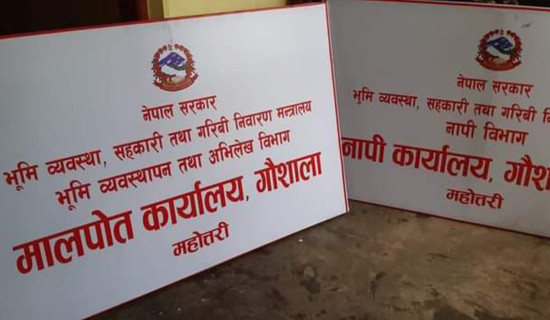- Monday, 2 February 2026
Ways To Address Revenue Shortfall
The government is under severe pressure to identify and harness the potential areas of income and resources to fund the general and capital expenditures to be provisioned in the budget for the upcoming year. The government sources say that it has faced an acute shortage of income to meet the basic expenditures such as salary component of civil servants, among others.
According to the news reports, several options, including the slashing the social security entitlement and benefits distributed to the senior citizens and other categories of underprivileged people, have been weighed upon to save resources especially for allocations to meet the general expenditures including the salary for the civil servants.
Meanwhile, lawmakers have raised heckles in the House the other day raising doubts over the alleged decision of the government to distribute financial package to ineligible ex- combatants who took part in the 10-year-long people’s war.
They have criticised the government, questioning the rationale of such a decision at a time the when the country is under several financial strain. The parliament has been prorogued the other day and it is not clear yet as to what how the government will deal with the issue since the differences over it have surfaced within the coalition partners. Finance Minister Dr. Prakash Sharan Mahat has shrugged off contending that he is not aware of the matter.
Irrational expenses
Such a situation of financial stress causes difficulties to the government in definite terms. However, the financial shrinkage can be addressed and overcome not by inflating the size of the purse through borrowing and loans or jeopardising the crucial social security provisions. This is possible by cutting down the unnecessary and irrational expenses dispensed to maintain the bloated size of bureaucracy and other agencies and ad hoc committees that are created for patronage distribution.
In fact, huge bureaucratic apparatus has been retained at the central level even as the country has gone for the federal reorganisation. Ad hoc bodies and agencies have been indiscriminately created at the federal and provincial levels. These demand expenses credited to the national exchequer thereby putting pressure on public expenditures. It is found that the multilevel governments are inclined to create new agencies through new spending initiatives instead of reorganising, or repurposing what is already available within the existing setup or institutional arrangements.
As a result, there are several programmes, projects and activities operated and handled by the governments both at the federal and provincial levels that have allegedly outlived their mission and objectives, duplicate efforts and resources, or operate below efficiencies. Besides the internal revenue shortfalls, the wasteful spending has been a contributing factor to the declining fiscal health and discipline giving ground to raise questions on the rational and justifiability of the federal polity.
Hence, there is a need to reflect on and review the patterns of the public expenditure in the country. In order to stop wasteful and unnecessary spending, government programmes should have a direct, clear, and immediate purpose and not duplicate other programmes. Likewise, all government spending should provide a necessary and essential public service and serve a clearly defined need, demands and interest of the people. In fact, there should not be any improper payments that result in monetary loss to the public exchequer. The government should strive to avoid overpaying to finance materials, projects and activities though dubious resort of cost manipulations and variation.
At a time when internal revenue base has declined significantly, public spending should be geared to restrain and refocus the threatening financial base. Taxpayers’ resources should be used in a wise manner to the extent possible. The government should eliminate duplicating and overlapping projects and programmes. The programmes and projects that do not yield intended results and outcomes should be either avoided or repurposed and eliminated. All illegal, improper and irrational payments need to be revoked for optimum utilisation of the public resources. When multiple agencies or programmes have similar goals, engage in similar activities or strategies, or target similar beneficiaries, the overlapping agencies can be downsised or eliminated to ensure better and coordinated response to save resources.
Fiscal discipline
The new Finance Minister of the coalition government is expected to initiate some steps towards cutting wasteful expenditures, disuse of resources and materials. No new agencies and new programmes should be created to extent possible if the similar objectives and results could be achieved by reorganising and making best use of what is already available within the vast state organization. The uncoordinated and disparate responsibilities entrusted to agencies give rise to waste of the public resources which has its adverse repercussions on the country’s governance and development. The new policies and programmes to be announced by the government should shun populist programmes and projects.
Moreover, budgetary allocations should be done wisely so that the projects that yield high impact are executed. Attention should also be given to maintaining fiscal discipline of the sub-national spending. The provincial and local governments spend around 30 per cent of the national budget. Reports of the Auditor General and many other assessments of public finance management show that the subnational governments have not able to perform in a way that satisfies merits and rationale of the federal devolution of state authority.
Since the financial budget of the provincial and local governments largely depend upon the transfers from the federal government, unwise and wasteful expenditure will strain the health of the overall economy. It is therefore necessary to build sound and clear public finance system to warrant that public expenditure across the levels of the government is based on openness and transparency. Spaces for citizen scrutiny should also be created to enhance the process of downward accountability.
(The author is presently associated with Policy Research Institute (PRI) as a senior research fellow. rijalmukti@gmail.com)
















